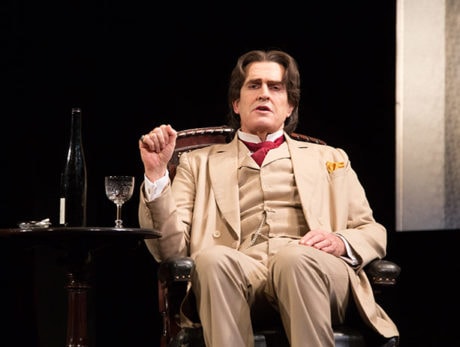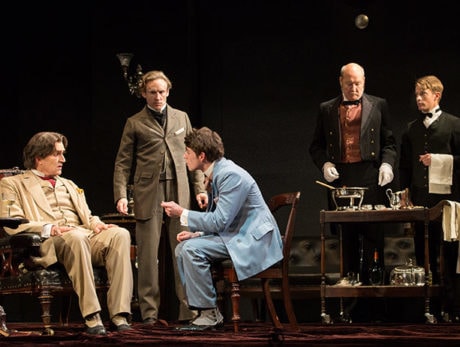David Hare’s play about a very specific time in the life of Oscar Wilde first appeared in New York in 1998, with Liam Neeson playing the brilliant Irish playwright Wilde, thus establishing himself as a major player in the Broadway scene. Hare’s play, The Judas Kiss, literate as always, was mildly received when it opened in ’98 and managed a reasonable run of 103 performances at the Broadhurst Theatre. It was just revived for a limited run which closed on June 12th at the Harvey Theatre in the Brooklyn Academy of Music, and like its predecessor, it comes to us from a London production.
It’s a total import, from star Rupert Everett down through the supporting cast who’ve played their roles in Hamptstead, London, and Toronto. This production was directed, as it was in London, by the Australian based Neil Armfield. I caught its final performance.
It was interesting to see Mr. Everett tackle the role, and succeed in doing so. This likable British leading man, best known perhaps for the gay best friend of Julia Roberts in the film My Best Friend’s Wedding, has a credit list in film, theatre and TV that is vast and varied. He’s currently in pre-production on a film which he will write, direct and produce —The Happy Prince. a film about Oscar Wilde’s last years in exile in Europe. Clearly he’s eager to continue exploring Wilde’s character, for The Judas Kiss dealt only with the moments before his arrest for “gross indecency” just after he lost his trial in 1895, and on a particular day two years later, when he’d been released from prison.
Though the BAM production was beautifully mounted, it played more like a lesson than a play. The first act, set in a room at the Cadogan Hotel in London, was imaginatively designed and lit by Dale Ferguson and Rick Fisher. A bed stage right was surrounded by miles of silk, with the intertwined bodies of Lord Alfred Douglas and a rent boy named Galileo (costumed by Mother Nature in the nude (later adorned by designs of keen-eyed Sue Blane) sleeping while a seemingly disinterested Oscar Wilde sat center stage in his own pool of light.It certainly caught the eye and grabbed our attention.
David Hare is a most intelligent and literate writer, but he does have a tendency to go on longer than he need, and ultimately I tend to tune out somewhere along the way, having been fed too much too soon. However, Rupert Everett’s remarkable transformation into an overweight genius of implacable conviction, was arresting, and remained so throughout the two hours that followed. In the second Act, he aged considerably after his prison time of two years at hard labor. He resembled an aging Somerset Maugham, now living in semi-squalor in a room near Naples, doomed to finish his days far from the glittering Mayfair that was the setting for his brilliant early comedies of manners that had so delighted (and still delight) international audiences.

Much as I admired Mr. Everett’s performance, and particularly that of Cal MacAninch as Robert Ross, Wilde’s oldest and dearest friend, I was more interested than greatly moved by the play.
Charlie Rowe had the youth, good looks and attitude of the would-be poet Lord Alfred Douglas (“Bosey”), but in the writing he is not an easy character for whom we feel much empathy. Spoiled, demanding, unfaithful, he claims to be totally in love with Wilde, but his behavior is so abominable that it only makes us think less of Wilde for fighting so to protect him.
Tom Colley as an Italian hustler was totally at home lying on the floor with nothing on, so relaxed in his body that those of us who are a little more circumspect finally joined him in paying little attention — as a result he was totally convincing as a simple soul to whom happiness could be defined as “making other people happy.”
We’ve had considerable material devoted to these middle years in the life of Oscar Wilde. The play Gross Indecency, the very early play Oscar Wilde, (1936 in London, 1938 on Broadway) which launched the career of Robert Morley, several films all pay attention to Wilde’s more sensational trial years, when he received a note from Alfred Douglas’ father, calling him a sodomite, and the legal tumult that followed. So though I enjoyed the performance of Rupert Everett and company, I did not feel any urgency in my reaction to the rest of the piece. A period piece to the core, a bit dusty now, it is still offering choice roles for actors in which to sink their talented teeth.

The Judas Kiss ended its run on Sunday, June 12, 2016 at The Harvey Theatre at The Brooklyn Academy of Music (BAM) – 651 Fulton Street, in Brooklyn, NY. For future BAM theatre events and productions, visit their website.




